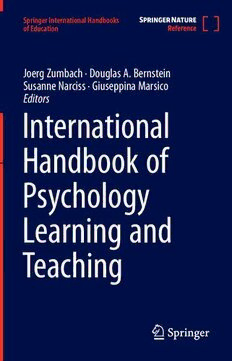Table Of ContentSpringer International Handbooks
of Education
Joerg Zumbach · Douglas A. Bernstein
Susanne Narciss · Giuseppina Marsico
Editors
International
Handbook of
Psychology
Learning and
Teaching
Springer International Handbooks of
Education
The Springer International Handbooks of Education series aims to provide easily
accessible, practical, yet scholarly, sources of information about a broad range of
topics and issues in education. Each Handbook follows the same pattern of exam-
iningindepthafieldofeducationaltheory,practiceandappliedscholarship,itsscale
andscopeforitssubstantivecontributiontoourunderstandingofeducationand,in
sodoing,indicatingthedirectionoffuturedevelopments.Thevolumesinthisseries
form a coherent whole due to an insistence on the synthesis of theory and good
practice. The accessible style and the consistent illumination of theory by practice
make the series very valuable to a broad spectrum of users. The volume editors
representtheworld’sleadingeducationalists.Theirtaskhasbeentoidentifythekey
areasintheirfieldthatareinternationallygeneralizableand,intimesofrapidchange,
ofpermanentinteresttothescholarandpractitioner.
(cid:129) (cid:129)
Joerg Zumbach Douglas A. Bernstein
(cid:129)
Susanne Narciss Giuseppina Marsico
Editors
International Handbook of
Psychology Learning and
Teaching
With64Figuresand92Tables
Editors
JoergZumbach DouglasA.Bernstein
DepartmentofEducationalResearch DepartmentofPsychology
UniversityofSalzburg UniversityofSouthFlorida
Salzburg,Austria Tampa,FL,USA
SusanneNarciss GiuseppinaMarsico
SchoolofScience- DepartmentofHuman,Philosophicaland
FacultyofPsychology,Psychology EducationalSciences(DISUFF)
ofLearningandInstruction UniversityofSalerno
TechnischeUniversitaetDresden Fisciano,Italy
Dresden,Sachsen,Germany
ISSN2197-1951 ISSN2197-196X(electronic)
SpringerInternationalHandbooksofEducation
ISBN978-3-030-28744-3 ISBN978-3-030-28745-0(eBook)
https://doi.org/10.1007/978-3-030-28745-0
©SpringerNatureSwitzerlandAG2023
Thisworkissubjecttocopyright.AllrightsarereservedbythePublisher,whetherthewholeorpartofthe
materialisconcerned,specificallytherightsoftranslation,reprinting,reuseofillustrations,recitation,
broadcasting,reproductiononmicrofilmsorinanyotherphysicalway,andtransmissionorinformation
storageandretrieval,electronicadaptation,computersoftware,orbysimilarordissimilarmethodology
nowknownorhereafterdeveloped.
Theuseofgeneraldescriptivenames,registerednames,trademarks,servicemarks,etc.inthispublication
doesnotimply,evenintheabsenceofaspecificstatement,thatsuchnamesareexemptfromtherelevant
protectivelawsandregulationsandthereforefreeforgeneraluse.
Thepublisher,theauthors,andtheeditorsaresafetoassumethattheadviceandinformationinthisbook
arebelievedtobetrueandaccurateatthedateofpublication.Neitherthepublishernortheauthorsorthe
editorsgiveawarranty,expressedorimplied,withrespecttothematerialcontainedhereinorforanyerrors
oromissionsthatmayhavebeenmade.Thepublisherremainsneutralwithregardtojurisdictionalclaims
inpublishedmapsandinstitutionalaffiliations.
ThisSpringerimprintispublishedbytheregisteredcompanySpringerNatureSwitzerlandAG.
Theregisteredcompanyaddressis:Gewerbestrasse11,6330Cham,Switzerland
Preface
As reflected in its title, this International Handbook of Psychology Learning and
Teachingwasdesignedtobeacomprehensivereferencetextdevotedtopresenting
ideas for how to improve the learning and teaching of psychology worldwide. Its
chapters are aimed at a broad audience, including psychology teacher trainees and
newfacultymemberswhoareinterestedinthebasicsofhowandwhattoteach,as
well as more experienced professors who are interested in training psychology
teachersorinevaluatingandimprovingtheeffectivenessoftheirownteaching.
Weweremotivatedtocreatethehandbookpartlybecause,althoughteachingand
learning can be designed and evaluated from a general educational perspective,
psychology, like all other academic disciplines, has its own traditions, course
content,andapproachestoteachingandlearning,aphenomenonsometimesreferred
to as pedagogical content knowledge (cf. Koehler & Mishra, 2008). We wanted to
showcasethatknowledgebyprovidingacomprehensivedescriptionofpsychology’s
core goals,contents, andtopics, aswell asthemethods,approaches,andresources
availableforteachingpsychologyinpsychologyprogramsandelsewhere.
We hope the handbook will also inspire psychology teachers to engage in
research in the scholarship of teaching and learning (SoTL; e.g., Felten, 2013).
SoTL has been defined as “the systematic study of teaching and learning, using
establishedorvalidatedcriteriaofscholarship,tounderstandhowteaching(beliefs,
behaviors, attitudes, and values) can maximize learning, and/or develop a more
accurate understanding of learning, resulting in products that are publicly shared
forcritiqueandusebyanappropriatecommunity”(Potter&Kustra,2011,p.2).
Inpsychology,thatcommunityisgrowingdramaticallyastheroleofpedagogical
content knowledge in our discipline has received more and more attention in recent
yearsfrompsychologyteacherswhoconduct,share,anddiscussresearchonpsychol-
ogy learning and teaching (Dunn et al., 2010). Their ideas and results are being
published in such US journals as Teaching of Psychology and The Scholarship of
TeachingandLearninginPsychology,aswellasinPsychologyLearningandTeach-
ing, the journal of the European Society of Psychology Learning and Teaching
(ESPLAT), and elsewhere. Their work is also being presented at numerous national
andinternationalteachingconferences(e.g.,ESPLATandtheU.S.’sNationalInstitute
on the Teaching of Psychology) as well as in teaching strands at research-oriented
internationalconferencessuchasthoseoftheAmericanPsychologicalAssociation,the
v
vi Preface
AssociationforPsychologicalScience,andtheInternationalCongressofPsychology.
Wehopethatthishandbookwillcontributeto,expand,andinspirefurtherthediscus-
sionamongmembersofthiscommunity.
Thehandbook’schapterswerewrittenbyexpertpsychologyteachersfromallover
theworldandcovertopicsgermanetotheteachingofallcorecoursesinpsychology,
whether taught in psychology programs or as part of curricula in other disciplines.
Eachchapterincludesanintroductiontoitstopic,providessomehistoricalcontext,a
reviewofrelevantliterature,asummaryoftheory-andevidence-basedapproachesto
teachingcoursecontent,includinginvariouseducationalandculturalcontexts,and
adviceonbestpracticesinthosecontexts.Somechaptersalsoprovideguidelinesand
checklistsdesignedtosupportpsychologyteachersintheirdailywork.
Thehandbookincludesthreemajorsections,eachofwhichcontainsseveralchap-
ters.Thefirstsection,“TeachingPsychologyasMainDisciplineinUndergraduateand
GraduatePrograms,”focusesonpsychologyteachingandlearningasamaindiscipline
in undergraduate and graduate psychology programs. The chapters in this section
address each of the major psychological sub-disciplines and offers evidence-based
advice on how best to teach the courses within those sub-disciplines. The second
section,“PsychologyLearning and Teaching for All Audiences,” focuses onseveral
target audiences within and outside tertiary education. The third section includes
severalchapterson“GeneralEducationalandInstructionalApproachestoPsychology
LearningandTeaching.”
Because it covers all central fields of Psychology, all major target groups, and all
major relevant educationalandinstructional approaches, we hope that this handbook
willprovideasolidbaseforpsychologyteachersworldwide,servingasastimulusfor
SoTLresearchinpsychology,asanintroductorytextfornewteachers,andasaguidefor
thoseinvolvedinthedevelopmentofteachertrainingprograms,courseandcurriculum
design,syllabuswriting,assessmentofteacherandstudentperformance,andthelike.
December2022 JoergZumbach
DouglasA.Bernstein
SusanneNarciss
GiuseppinaMarsico
References
Dunn, D. S., Beins, B. B., McCarthy, M.A., & Hill, G. W. (Eds.). (2010). Best
practices for teaching beginnings and endings in the psychology major:
Research,cases,andrecommendations.Oxford:UniversityPress.
Felten, P. (2013). Principles of good practice in SoTL. Teaching and Learning
Inquiry,1(1),121–125.
Koehler, M., & Mishra, P. (2009). What is technological pedagogical content
knowledge(TPACK)?ContemporaryIssuesinTechnologyandTeacher Educa-
tion,9(1),60–70.
Potter, M.K.,&Kustra,E.(2011). Therelationship betweenscholarly teachingand
SoTL:Models,distinctions,andclarifications.InternationalJournalfortheSchol-
arshipofTeachingandLearning,5(1).http://www.georgiasouthern.edu/ijsotl
Contents
Volume 1
PartI TeachingPsychologyasMainDisciplineinUndergraduate
andGraduatePrograms .................................... 1
1 TeachingIntroductoryPsychology ......................... 3
MelissaJ.BeersandBridgetteMartinHard
2 LearningandTeachinginClinicalPsychology ................ 25
SusanneKnappe
3 MappingNormality:TeachingAbnormalPsychology .......... 49
BrianL.BurkeandMeganC.Wrona
4 SensationandPerception ................................ 75
RobertGaschler,MariamKatsarava,andVeitKubik
5 TeachingthePsychologyofLearning ....................... 101
StephanieA.Jesseau
6 TeachingofGeneralPsychology:ProblemSolving ............ 131
DavidGibson,DirkIfenthaler,andSamuelGreiff
7 GeneralPsychologyMotivation ........................... 151
MariaTulisandJ.LukasThürmer
8 Topics,Methods,andResearch-BasedStrategiesforTeaching
Cognition ............................................. 177
MayaM.KhannaandMichaelJ.Cortese
9 HowtoDesignandTeachCoursesonVolitionandCognitive
Control .............................................. 201
ThomasGoschkeandAnnetteBolte
10 DevelopmentalPsychology ............................... 239
MoritzM.DaumandMirellaManfredi
vii
viii Contents
11 DevelopmentalPsychology:MovingBeyondtheEast–West
Divide ............................................... 273
NanditaChaudhary,MilaTuli,andAyeshaRaees
12 TeachingPhysiologicalPsychology ......................... 301
JaneA.Foster
13 TeachingSocialPsychologyEffectively ...................... 313
ScottPlous,DavidG.Myers,MaryE.Kite,andDanaS.Dunn
14 TeachingHealthPsychologyHere,There,andEverywhere ...... 339
AriannaM.StoneandReganA.R.Gurung
15 EducationalPsychology:LearningandInstruction ............ 357
NeilH.Schwartz,KevinClick,andAnnaN.Bartel
16 NeuroscienceinthePsychologyCurriculum ................. 391
JenniferParadaandLeighannR.Chaffee
17 TeachingtheFoundationsofPsychologicalScience ............ 421
ReganA.R.GurungandAndrewChristopher
18 TheMethodologyCycleastheBasisforKnowledge ........... 437
JaanValsinerandAngelaUchoaBranco
19 QualitativeMethodology ................................. 453
GünterMey
20 PsychologicalAssessmentandTesting ...................... 479
LeslieA.MillerandRubyA.Daniels
21 IndividualDifferencesandPersonality ...................... 513
ManfredSchmitt
22 TeachingofWorkandOrganizationalPsychologyinHigher
Education ............................................ 539
NiclasSchaper
23 TeachingEngineeringPsychology .......................... 567
SebastianPannasch,MartinBaumann,LewisL.Chuang,and
JuergenSauer
24 CulturalPsychology .................................... 589
LucaTateo,GiuseppinaMarsico,andJaanValsiner
25 TeachingMediaPsychology .............................. 609
ChristopherJ.Ferguson
26 UnfurlingthePotentialoftheCounselor .................... 629
SujataSriramandSwarnimaBhargava
Contents ix
27 GenderStudies ........................................ 659
TissyMariamThomasandU.ArathiSarma
28 TeachingSchoolPsychologytoPsychologists ................. 699
M.BeatriceLigorio,StefanoCacciamani,andEmanuelaConfalonieri
29 CommunityPsychologyandPsychologicalDistress ............ 725
PaulRhodes
30 IndigenousPsychology .................................. 741
DaniloSilvaGuimarães
31 TeachingPsychopharmacologyforUndergraduates ........... 763
JenniferM.J.McGee
Volume 2
PartII PsychologyLearningandTeachingforAllAudiences .... 789
32 PsychologyinSocialScienceandEducation ................. 791
MonicaMolloandRuggeroAndrisanoRuggieri
33 PsychologyinTeacherEducation .......................... 807
SusanneNarcissandJoergZumbach
34 TeachingPsychologyinSecondaryEducation ................ 847
RobMcEntarfferandKristinWhitlock
35 PsychologyinWorkandOrganizationalEducation ............ 865
PedroF.Bendassolli,SoniaGondim,andFellipeCoelho-Lima
36 PsychologicalLiteracyandLearningforLife ................ 881
JulieA.HulmeandJacquelynCranney
37 PsychologyinProfessionalEducationandTraining ........... 911
ChristophSteinebach
38 TeachingSportandExercisePsychology .................... 943
RobertWeinbergandJoanneButt
39 FamilyTherapy ........................................ 965
MariaElisaMolina,PabloFossa,andVivianaHojman
40 MedicalEducation ..................................... 979
RicardoGorayebandM.CristinaMiyazaki
41 PsychologyofArt ...................................... 993
LiadaRochaLordelo

